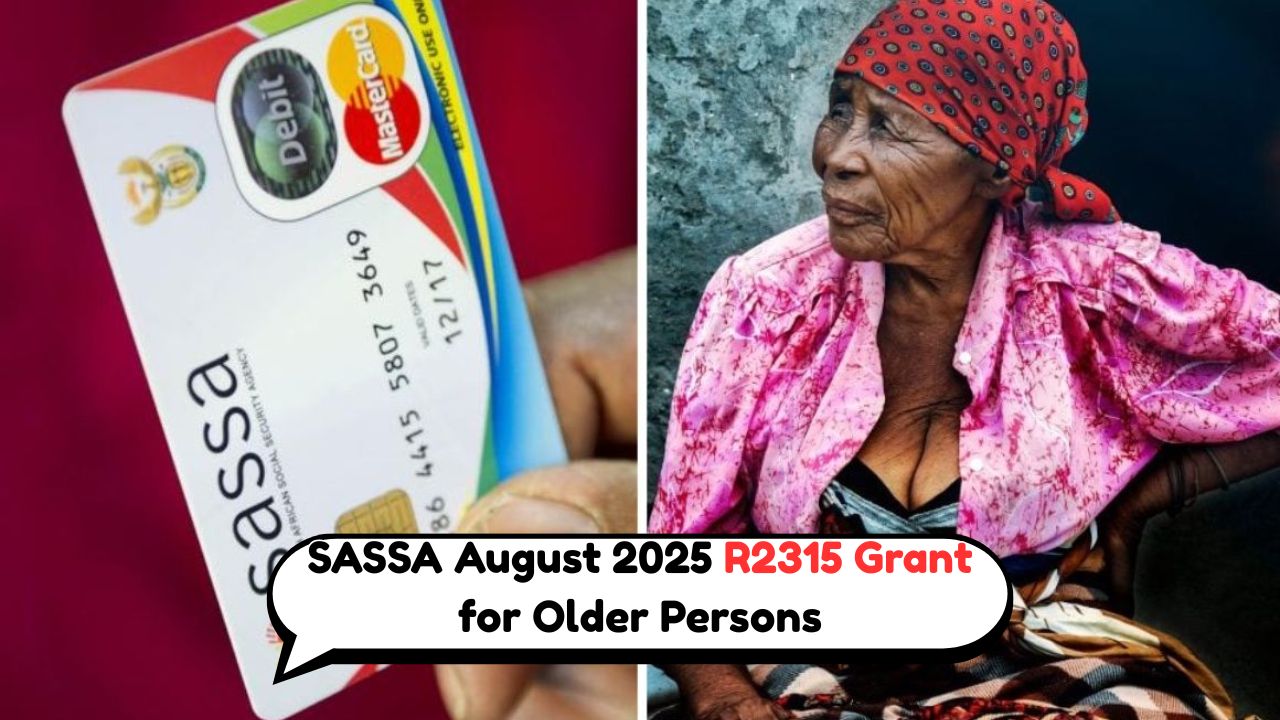Full Payment Breakdown – South Africa’s August 2025 social grant cycle brings welcome clarity for seniors as SASSA confirms the Older Persons Grant at R2,315 for qualifying beneficiaries, with a slightly higher amount paid to those aged 75 and above. This month’s update emphasizes predictable payment sequencing, stronger identity safeguards, and a cleaner process for beneficiaries who use bank accounts instead of cash pay points. The goal is simple: make sure every rand intended for food, transport, electricity, and chronic medication actually reaches older people on time. Beneficiaries are reminded to keep personal details current, especially mobile numbers and banking information, to avoid avoidable holds. Where necessary, SASSA may request additional verification to combat fraud, but these checks are designed to be quick and non-disruptive. Seniors who require full-time care can still apply for the separate Grant-in-Aid top-up once assessed. If you’re budgeting for August, plan around your usual collection channel and allow for bank processing windows so you can schedule clinic visits, school support for grandchildren, and monthly essentials with confidence.
August payment flow, channels, and balance checks
Expect the standard phased payment pattern that prioritises orderliness and safety. Most Older Persons Grant recipients receive funds first in the cycle, followed by other grant categories on subsequent days, which helps reduce queues and system congestion. If you’re paid into a personal bank account, your money typically reflects once SASSA releases the batch and your bank finishes its clearing steps—so check your balance via your bank’s app, ATM, or SMS alerts rather than relying on informal messages. SASSA/Postbank card users can withdraw at major retailers or ATMs and should keep slips for proof of payment. Avoid third parties who offer “early access” at a fee; they usually erode your grant and can trigger disputes. If your card is lost or expired, visit an official point with your ID for replacement guidance, and don’t share PINs. Where cash pay points operate, go on your assigned day, carry water, and store funds safely before traveling home.
Who qualifies, documents required, and keeping your record clean
To qualify for the Older Persons Grant, you must meet age requirements (60+), pass the means test, reside in South Africa, and not be maintained in a state institution. Applications are assessed on verified identity and financial circumstances, so make sure your SA ID, proof of residence, bank confirmation (if you choose bank payments), and any income or asset documents are accurate and up to date. If you previously used a different collection method, you may switch to a bank account by submitting the correct banking form; allow time for SASSA to validate details to prevent misdirected payments. Report any changes—address, marital status, employment income—promptly to keep your file compliant and avoid suspensions. If your application or review is pending, keep the reference number and check status regularly through official channels. Remember: you cannot receive more than one social grant of the same type, and any private loan deductions must be lawful and explicitly authorised.
Full payment breakdown for August 2025 (how your R2,315 is structured)
The Older Persons Grant for ages 60–74 is R2,315 in August 2025, while beneficiaries aged 75+ receive a slightly higher amount under the same programme. In practice, your “net in hand” depends on three things: (1) your chosen payment channel (bank account, SASSA/Postbank card at retailers/ATMs, or designated cash points), (2) any lawful, pre-authorised deductions visible on your payment slip or bank statement, and (3) timing effects from bank clearing. The base grant is not a wage and is designed for essential household needs; it is separate from any Grant-in-Aid top-up for beneficiaries who require full-time care, which is applied only after an assessment and approval. SASSA does not charge a withdrawal fee at participating retailers, but banks and ATMs may levy standard transaction fees—check your bank’s schedule. Keep printed or digital records of each withdrawal, and if you spot an unknown deduction, log a dispute immediately and request written confirmation of the investigation timeline.
What to do if payment is late, reduced, or you need to appeal
If your August amount has not reflected by the expected window, first confirm that your ID, bank details, and mobile number match SASSA’s records. Next, check whether a review, life-status verification, or biometric check was requested and not yet completed—these safeguards protect your grant from fraud but can pause disbursement until you comply. If the amount is lower than R2,315 (or the higher 75+ rate), inspect your slip or bank statement for authorised deductions; cancel any products you no longer want directly with the provider and notify SASSA of disputes. For formal appeals or reinstatements, submit the required forms promptly and keep copies of all documents and reference numbers. When visiting a pay point or office, carry your original ID, any letters from SASSA, and a recent bank confirmation if you changed accounts. Finally, avoid unofficial “helpers,” never pay for appointment slots, and insist on receipts and stamped acknowledgements for every submission.
